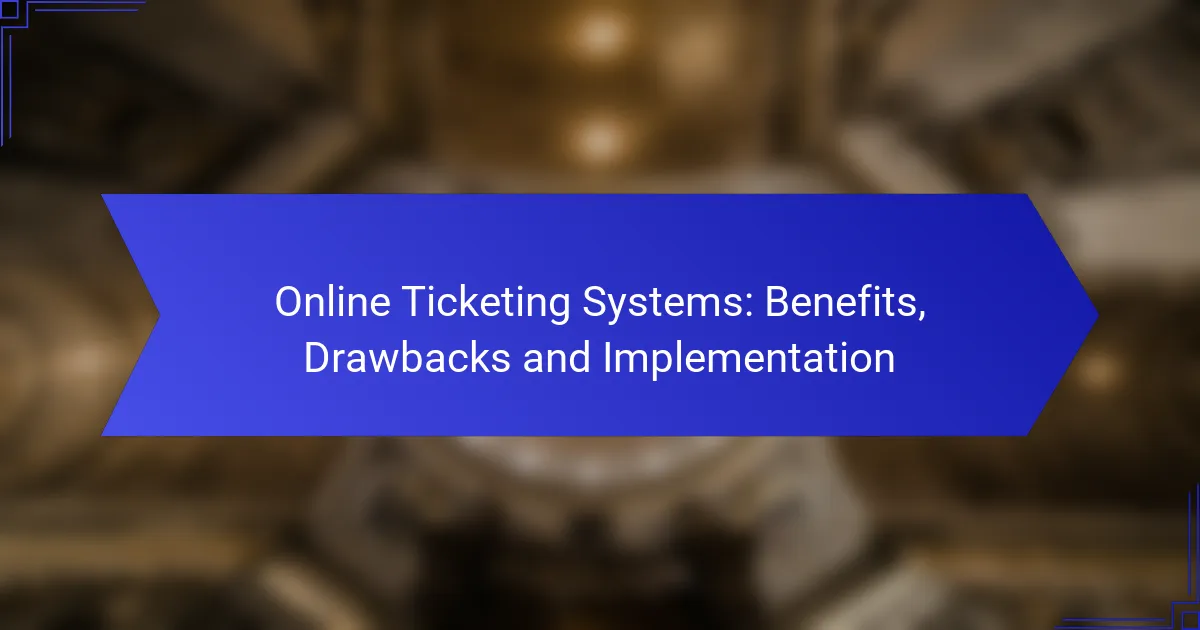Online ticketing systems have transformed the way events are organized and attended, providing significant benefits such as enhanced accessibility and improved customer satisfaction. However, they also present challenges, including potential technical issues and security concerns. Implementing these systems requires careful planning and integration to ensure a seamless experience for both users and organizers.
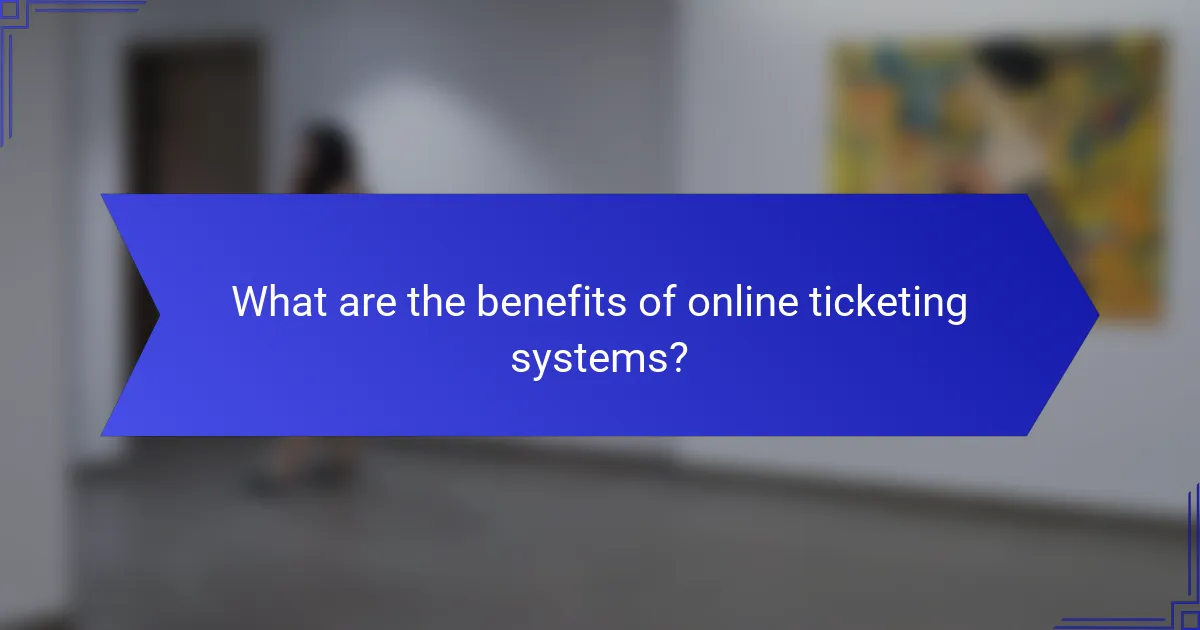
What are the benefits of online ticketing systems?
Online ticketing systems offer numerous advantages, including enhanced accessibility, streamlined processes, and improved customer satisfaction. These systems enable users to purchase tickets conveniently from anywhere, while organizers can manage events more efficiently.
Increased convenience for customers
Online ticketing systems provide customers with the ability to purchase tickets at any time and from any location. This flexibility eliminates the need for physical trips to box offices, allowing users to secure their tickets quickly and easily.
Additionally, many platforms offer mobile-friendly interfaces, enabling ticket purchases directly from smartphones. This convenience can significantly enhance the overall customer experience, leading to higher sales and repeat business.
Real-time inventory management
With online ticketing systems, event organizers can monitor ticket sales in real-time, allowing for better inventory management. This capability helps prevent overselling and ensures that customers can purchase tickets with confidence.
Real-time data also enables organizers to adjust pricing strategies based on demand, optimizing revenue potential. For example, dynamic pricing can be employed to increase ticket prices as an event date approaches, reflecting growing demand.
Enhanced data collection and analytics
Online ticketing platforms gather valuable data on customer preferences and purchasing behaviors. This information can be analyzed to improve marketing strategies and tailor future events to better meet audience needs.
Organizers can track metrics such as ticket sales trends, demographics, and engagement levels. This data-driven approach allows for more informed decision-making and targeted promotions, ultimately enhancing event success.
Cost savings for event organizers
Implementing an online ticketing system can lead to significant cost savings for event organizers. By reducing the need for physical ticketing infrastructure and staff, organizations can allocate resources more efficiently.
Furthermore, many online platforms charge lower fees compared to traditional ticketing methods, allowing organizers to retain a larger share of ticket revenues. This financial efficiency can be crucial for smaller events or organizations with limited budgets.
Improved customer engagement
Online ticketing systems facilitate better customer engagement through features like automated email confirmations and reminders. These communications keep customers informed and can enhance their overall experience.
Additionally, many platforms allow for integration with social media, enabling customers to share their event attendance with friends. This not only boosts engagement but also serves as a marketing tool, potentially attracting new attendees through word-of-mouth promotion.
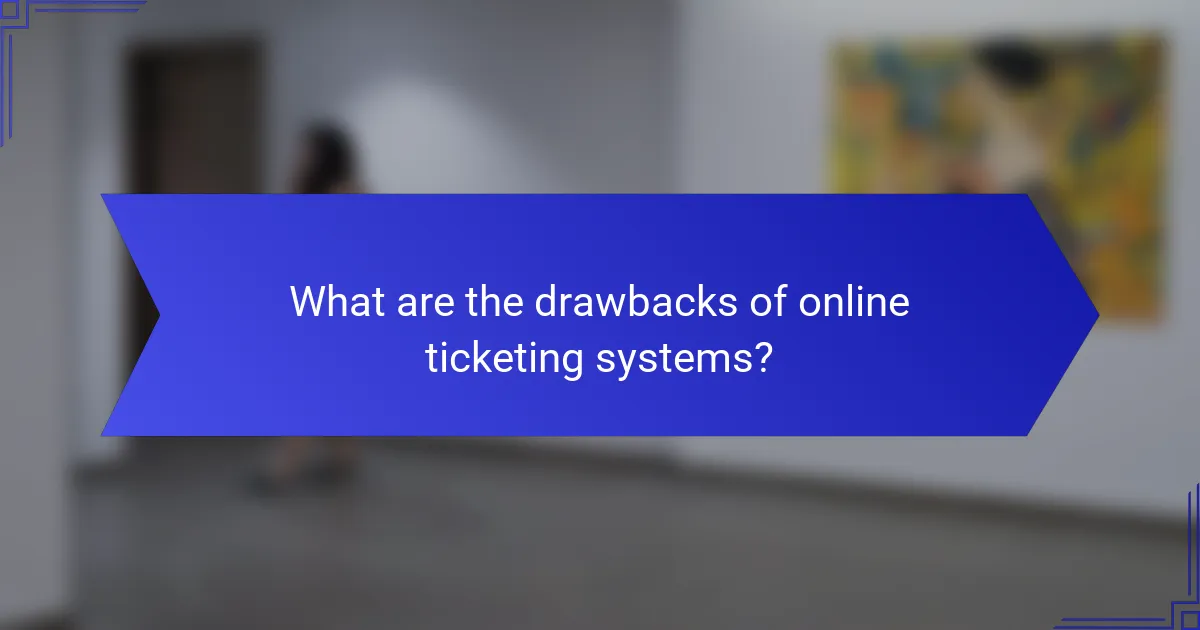
What are the drawbacks of online ticketing systems?
Online ticketing systems offer convenience but also come with several drawbacks that users should consider. These include potential technical issues, security concerns with online payments, dependence on internet access, and limited personal interaction.
Potential technical issues
Technical issues can arise during the ticket purchasing process, such as website crashes or slow loading times. These problems can lead to frustration and missed opportunities, especially during high-demand events where tickets sell out quickly.
Users should ensure they are using reliable platforms and check for system updates before purchasing. It’s advisable to have a backup plan, such as alternative ticketing sites or physical box offices, in case of technical failures.
Security concerns with online payments
Security is a significant concern when making online payments for tickets. Users risk exposing their financial information to cyber threats, including data breaches and phishing scams.
To mitigate these risks, select ticketing platforms that use secure payment gateways and offer buyer protection. Look for sites that comply with industry standards, such as PCI DSS, to ensure a safer transaction experience.
Dependence on internet access
Online ticketing systems require a stable internet connection, which can be a limitation for users in areas with poor connectivity. This dependence can hinder access to tickets, particularly for those who may not have reliable internet service.
Consider using mobile data or visiting locations with free Wi-Fi when attempting to purchase tickets. It’s also wise to plan ahead and secure tickets during off-peak hours to avoid connectivity issues.
Limited personal interaction
Purchasing tickets online often lacks the personal interaction found in traditional box offices. This can lead to a less personalized experience, where customers miss out on advice or recommendations from staff.
For those who value personal service, consider combining online purchases with visits to box offices when possible. Engaging with staff can provide insights into events and enhance the overall experience.
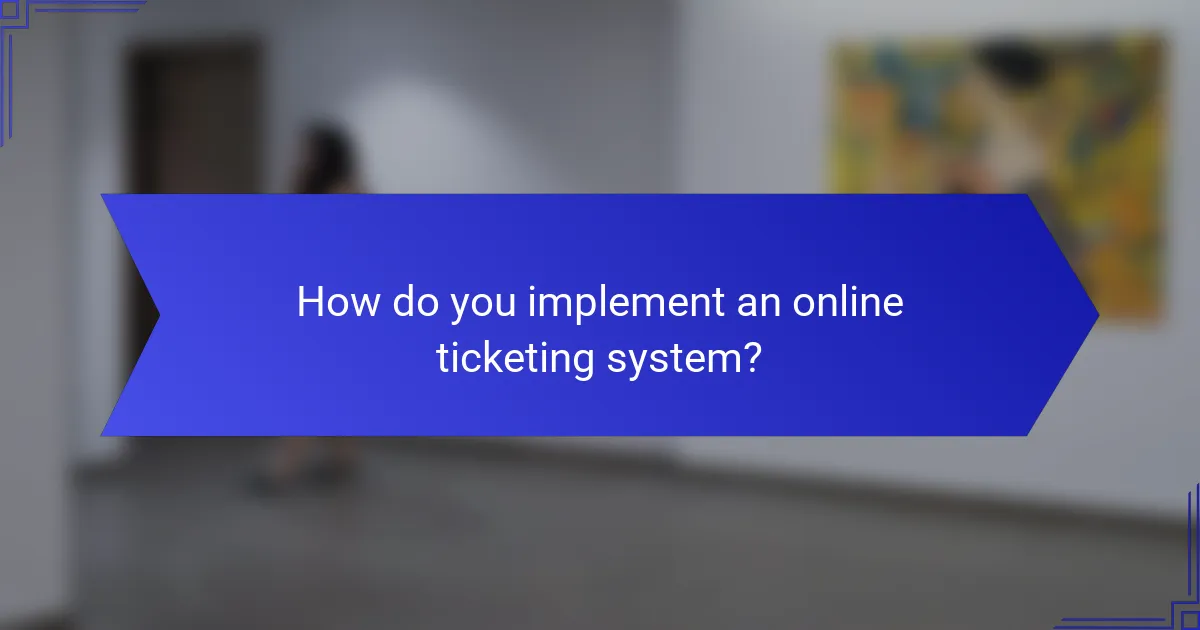
How do you implement an online ticketing system?
Implementing an online ticketing system involves selecting a suitable platform, setting up payment processing, integrating with existing systems, and thoroughly testing before launch. Each step requires careful consideration to ensure a smooth user experience and operational efficiency.
Choosing the right platform
Selecting the right platform is crucial for your online ticketing system’s success. Consider factors such as user interface, scalability, and customer support. Popular options include Eventbrite, Ticketmaster, and custom solutions tailored to specific needs.
Evaluate platforms based on features like mobile compatibility, reporting capabilities, and integration options. Look for user reviews and case studies to understand how well a platform meets the needs of similar organizations.
Setting up payment processing
Payment processing is a key component of an online ticketing system. Choose a payment gateway that supports various payment methods, including credit cards and digital wallets, to cater to a broad audience. Common providers include PayPal, Stripe, and Square.
Ensure that the payment system complies with relevant regulations, such as PCI DSS, to protect customer data. Test the payment process thoroughly to minimize transaction errors and ensure a seamless experience for users.
Integrating with existing systems
Integrating your ticketing system with existing software, such as CRM or marketing tools, can enhance efficiency. Look for platforms that offer APIs or built-in integrations to streamline data flow between systems.
Consider how the integration will impact user experience and operational workflows. Proper integration can help automate tasks like customer communication and reporting, saving time and reducing errors.
Testing and launching
Before launching your online ticketing system, conduct comprehensive testing to identify and resolve any issues. This includes testing the user interface, payment processing, and integration with other systems. Gather feedback from a small group of users to identify potential improvements.
Once testing is complete, plan a strategic launch. Consider promotional activities to attract users and monitor system performance closely during the initial phase to address any unforeseen challenges quickly.

What are the key features to look for in an online ticketing system?
When selecting an online ticketing system, focus on features that enhance user experience, streamline operations, and provide valuable insights. Key features include a user-friendly interface, mobile compatibility, customizable ticket options, and robust reporting and analytics tools.
User-friendly interface
A user-friendly interface is essential for both customers and staff. It should allow users to navigate easily, find events quickly, and complete transactions without confusion. Look for systems that offer intuitive design, clear calls to action, and minimal steps to purchase tickets.
Consider systems that provide a seamless checkout process, as this can significantly reduce cart abandonment rates. Features like guest checkout and saved payment methods can enhance user satisfaction and encourage repeat purchases.
Mobile compatibility
Mobile compatibility is crucial, as a significant portion of ticket purchases occurs on smartphones. Ensure the ticketing system is optimized for mobile devices, providing a responsive design that adapts to various screen sizes. This will improve accessibility and convenience for users on the go.
Additionally, consider whether the system has a dedicated mobile app. Apps can offer features like push notifications for event updates and easy access to tickets, enhancing the overall user experience.
Customizable ticket options
Customizable ticket options allow event organizers to tailor their offerings to different audience segments. Look for systems that enable you to create various ticket types, such as early bird, VIP, or group discounts. This flexibility can help maximize sales and reach a broader audience.
Consider whether the system allows for add-ons, such as merchandise or food packages, at the point of purchase. This can increase average transaction values and provide a more comprehensive experience for attendees.
Reporting and analytics tools
Robust reporting and analytics tools are vital for understanding ticket sales and customer behavior. A good system should provide real-time data on sales trends, customer demographics, and event performance. This information can guide marketing strategies and improve future events.
Look for features that allow you to generate customizable reports, track key performance indicators (KPIs), and export data for further analysis. Having access to these insights can help you make informed decisions and optimize your ticketing strategy.
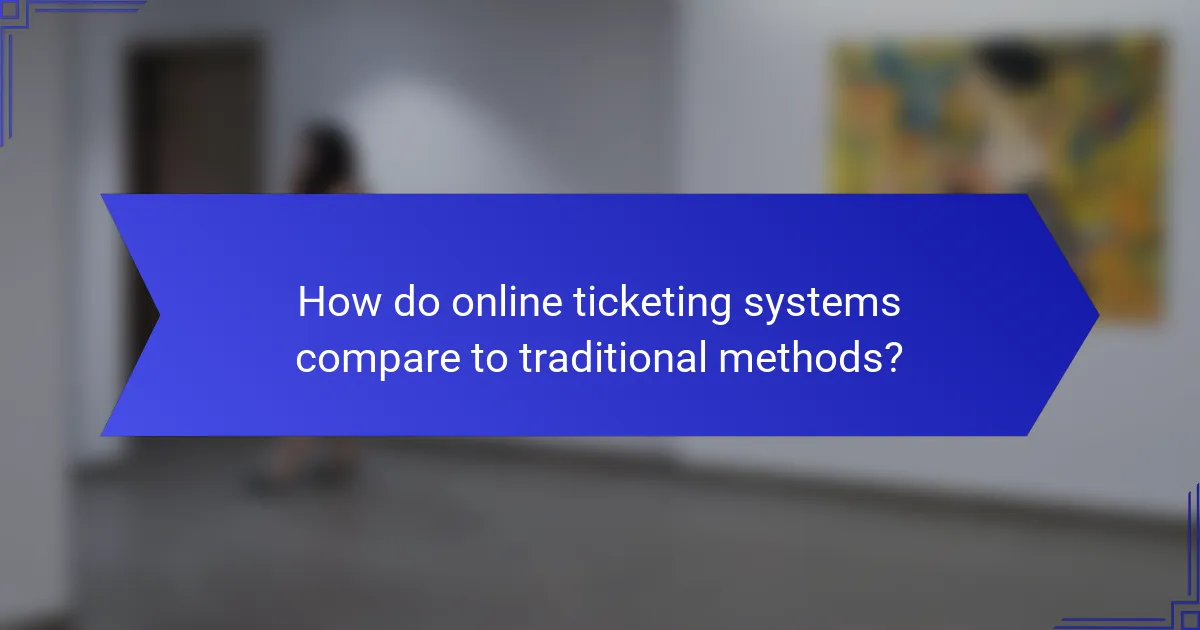
How do online ticketing systems compare to traditional methods?
Online ticketing systems offer a more efficient and convenient way to purchase tickets compared to traditional methods. They streamline the buying process, reduce wait times, and often provide better access to real-time information on availability and pricing.
Benefits of online ticketing systems
Online ticketing systems provide several advantages over traditional methods. They allow customers to purchase tickets from anywhere, at any time, eliminating the need to travel to a physical location. Additionally, these systems often feature user-friendly interfaces, making it easy to compare prices and select preferred seats.
Another significant benefit is the ability to manage ticket sales more effectively. Event organizers can track sales in real-time, adjust pricing dynamically, and reduce the risk of overbooking. This data-driven approach can lead to increased revenue and better customer satisfaction.
Drawbacks of online ticketing systems
Despite their advantages, online ticketing systems come with some drawbacks. One major concern is the reliance on technology; users may face issues such as website crashes or payment processing failures. Additionally, not all customers are comfortable with online transactions, particularly older demographics who may prefer traditional methods.
Security is another critical issue. While many online ticketing platforms implement robust security measures, the risk of data breaches and fraud remains a concern for both consumers and event organizers. It’s essential to choose reputable platforms that prioritize user data protection.
Implementation considerations
Implementing an online ticketing system requires careful planning and consideration. First, assess the specific needs of your event or organization, including ticket types, pricing strategies, and expected sales volume. Choosing the right platform is crucial; look for features that align with your requirements, such as mobile compatibility and customer support.
Additionally, consider integrating your ticketing system with other tools, such as marketing software or CRM systems, to enhance customer engagement and streamline operations. Training staff on the new system is also vital to ensure a smooth transition and effective use of the technology.
